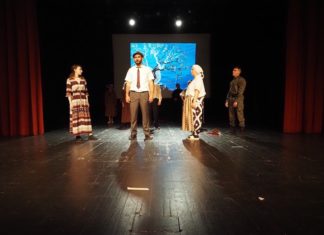Three prominent foreign authors – Neždet Mustafa, Sofiya Zahova, and Fred Taikon – were guests at the literary evening held on November 6, 2023, as part of the World Day of the Romani Language program in the Croatian Romani Union “KALI SARA” headquarters. In the first part of the evening, Neždet Mustafa, former minister in the Macedonian government and mayor of Šuto Orizari municipality, in a conversation with Maja Grubišić, head of the Roma Educational and Cultural Center in Zagreb, presented his recently published political book Romi i antidefetizam(op. prev. Roma and Anti-defeatism. In the second part, Sofiya Zahova, a researcher from the Vigdís Finnbogadóttir Institute of Foreign Languages in Iceland, first gave a general overview of Romani literature and its characteristics, and then, in a conversation with Fred Taikon, a Swedish writer and journalist, she presented his work to the audience.
The book Roma and Anti-defeatism, published in 2023 in Skopje, is a political handbook derived from Mustafa’s many years of experience in high politics. He started his political career in 1991 by founding the first Roma party in North Macedonia, PCER or the Party for the Total Emancipation of Roma. After three years spent as editor of the Roma department of Macedonian Radio and Television, in 1996 he became the head of the largest Roma settlement in Europe, Šuto Orizari municipality, where he remained until 2002. Since 2004, he has been the general secretary of the Council of Europe’s European Roma and Travellers Forum in Strasbourg. The highlight of Mustafa’s career was the position of minister without portfolio in the North Macedonian government from 2008 to 2017.
At the literary evening, Mustafa highlighted education, unity, and democratic participation as the three key elements in the formation of Roma politics. As he said, democracy as a political system offers everyone the opportunity to have their voice heard politically. At the same time, no one can achieve anything without voicing their requests, and the Roma must recognize that their voice has great power. Mustafa compared the position of the Roma with the struggle of Afro-Americans for political and civil rights, especially the struggle led by Martin Luther King and his vision summed up in the catchphrase ‘I have a dream’. In this regard, Mustafa pointed out that without political unity, the Roma would not be able to achieve their visions and goals. In addition to the fight against this kind of self-destructiveness, the Roma on their political path must recognize that their development largely depends on themselves alone and that they should not look for the cause of the problem in others others, but themselves. This includes, on the one hand, investment in education to explore and strengthen all relevant aspects of Roma emancipation, and on the other, a determined fight for their interests, much stronger than the current one where, as Mustafa points out, Roma are resisting the resistance or, in other words, are too passive. The goal, concludes Mustafa, is for the Roma to modernize themselves by using democratic tools and to become equal among equals from the perspective of political and civil rights.
The second part of the literary evening was opened by Sofiya Zahova with a short presentation on Romani literature. She defined it as works, books, and publications authored by Roma and/or in the Romani language and which, among other things, are intended for a Roma audience. According to historical periodization, the period of the 19th century until the Second World War was marked by the first publication of such works. In the second half of the 20th century, more and more educational works and folk Roma literature were published, and in the decade from 1990 to 2000, recognition of Roma cultural and literary activity and state support for Roma publications became a key factor in the development of Roma literature. From that period to the present day, publishing and promotion have largely moved to online platforms. With a periodization that points to the already high level of development of Romani literary production and by highlighting prominent Romani writers, Zahova opposes, as she calls them, the misconceptions that are present in the external, non-Roma population: that Roma are resistant to education, that their oral tradition hinders writing, that Roma are not interested in history, that Roma communities are ahistorical, and that Roma culture is strictly patriarchal and oppressive for women’s literary activity.
After a general overview of Romani literature, Zahova continued a conversation with prominent Romani writer and activist from Sweden, Fred Taikon. Taikon is the founder of the Roma Cultural Center in Stockholm, the initiator of the magazine É Romani Glinda, the author of numerous books for children, and the winner of two of the most prominent Swedish awards – “Illis quorum” golden medal for outstanding contribution to Swedish culture, science, or society and the “Raoul Wallenberg Prize, awarded to individuals who fight for the rights of vulnerable groups, in memory of Swedish diplomat who saved thousands of Jews from persecution during World War II. Taikon cited his grandfather, the famous Roma activist Johann Dimitri Taikon, and Erik Ljungberg, a non-Roma who lived with the Roma for a long time and who wrote a grammar and dictionary of the Kaldera dialect of the Romani language as the main role models who led him to the path of literature and activism. In addition to these role models in the fight for Roma rights, Taikon also spoke about how the education process was carried out among Roma in the period after the Second World War, about the familiarity of today’s Roma in Sweden with their language and culture, and about his magazine É Romani Glinda, which after 19 years of existence had to stop publication due to insufficient financial and institutional support.












